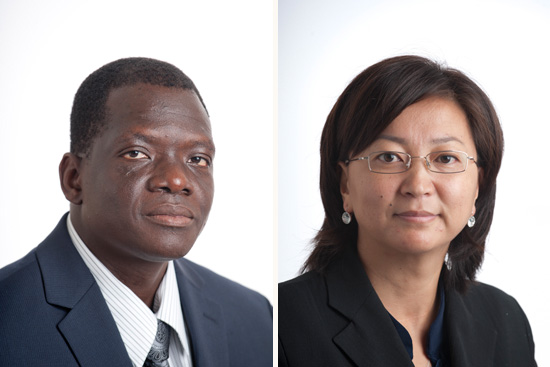Humphrey Fellowships Bring Foreign Professionals to Study
BU’s three decades of participation in international program

Enkhtseteg Chuluunbat and Nestor Kahoun have spent their lives dedicated to public service, fighting poverty in their respective homelands. Now, leaving behind their young children, they have traveled half a world away to study at BU. They’re among 15 Hubert H. Humphrey fellows on campus this year.
Created by Congress in 1978 in honor of the late Minnesota senator and vice president, the Hubert H. Humphrey Fellowship Program brings about 160 foreign professionals to American universities annually for an academic year of study and hands-on experience. Receiving a certificate, although no advanced degree, these are people, according to the program, who have demonstrated the “potential for national leadership and commitment to public service,” from countries spanning from Africa to Latin America and Asia to the Middle East. BU is one of only two schools (the other is Humphrey’s alma mater, the University of Minnesota) to have participated since the program’s inception, and more than 400 people have been fellows here, says Ksenya Khinchuk, director of the fellowship program at BU.
Chuluunbat, a former financial industry examiner for the Mongolian government, is studying securities and banking regulation at the School of Law. Once the academic year wraps up, she’ll return home to a job at a nongovernmental organization advocating for financial sector transparency. Working to modernize her country’s financial rules, she says, justifies the months she must spend apart from her husband and three children, the youngest just two years old. “If the capital market develops in Mongolia, it will improve economic conditions,” she says. “We have to attract investment in Mongolia.” Still, she confides, at times she cries from homesickness.
Poverty back home also drives Kahoun, the promotional director of museums for the government of his native Burkina Faso, in West Africa. The Humphrey fellowship “was a great chance for me to be selected to develop my skills here,” taking course work at Metropolitan College and the School of Management. He’s also been to the Smithsonian and plans to visit the Museum of Fine Arts.
Kahoun wants both to hone his administrative skills and to promote his country’s growing tourist industry in the hopes of improving living standards. His first class alone filled him with ideas: “From one sentence, I can see many things that I can do in my country.”
He keeps in touch with his wife and two children, ages 15 and 3, via phone and Skype. “Leaving to do something for change—this is a kind of sacrifice that we can accept,” he says. “We are called an underdeveloped country. We need to give ourselves to change lives. People are suffering from poverty.”
The University makes apartments available on Buswell Street for BU’s Humphrey fellows, so most of them live on campus. They officially enroll in the School of Management—the Humphrey program leans on the University especially for its financial and education programs—but they may take classes in any school, says Khinchuk. The program will supplement their classroom instruction this year with field trips to the New York Stock Exchange, the Securities and Exchange Commission, and financial and education centers in Boston and Washington, D.C.
The University also brainstorms creative ways to take advantage of its visitors’ expertise. “In 1999, we created an international cookbook with some of the most unique, exotic, and delicious recipes provided by our own fellows,” says Khinchuk. Proceeds go to a fundraising program for counseling and material assistance to African children orphaned by war. That program also gets money from an annual auction of household items left by the previous year’s fellows, bid on by the incoming coterie.
Hubert Humphrey, for whom the program is named, served as vice president under Lyndon Johnson, from 1965 to 1969, ran three times for the presidency, and first came to national prominence as an advocate of civil rights at the 1948 Democratic National Convention. He pursued that cause and social welfare programs as a senator from 1948 to 1965 and again from 1971 until his death in 1977. The fellowships aim to bring about “his sincere hope for greater understanding among nations,” according to the program’s website, and are designed to provide a “foundation for establishing lasting ties between citizens of the United States and their professional counterparts in other countries.”
Both Kahoun and Chuluunbat are grateful for the opportunity the program affords them and, in Chuluunbat’s words, to “the American people, taxpayers, who actually created this wonderful program that enables us to learn more aspects of American culture and American life.”
Rich Barlow can be reached at barlowr@bu.edu.

Comments & Discussion
Boston University moderates comments to facilitate an informed, substantive, civil conversation. Abusive, profane, self-promotional, misleading, incoherent or off-topic comments will be rejected. Moderators are staffed during regular business hours (EST) and can only accept comments written in English. Statistics or facts must include a citation or a link to the citation.